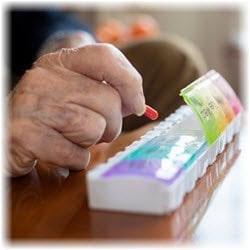Heart Disease: Managing Many Medicines
 If you have heart disease, you probably take more than one medicine to maintain your health. It is important to follow guidelines whether you take prescription medicines, over-the-counter (OTC) medicines, or both. The tips below will help you get the most from your medicines. They will also help you prevent unpleasant or dangerous side effects.
If you have heart disease, you probably take more than one medicine to maintain your health. It is important to follow guidelines whether you take prescription medicines, over-the-counter (OTC) medicines, or both. The tips below will help you get the most from your medicines. They will also help you prevent unpleasant or dangerous side effects.
Always follow the label directions. Follow your doctor’s directions or the label of an OTC. “Taking a smaller dose to save money or a bigger dose for faster results is risky to a patient’s health,” says Aditya Ambegaonkar MD, PIH Health cardiologist. “Take only the recommended amount and number of doses at the time of day indicated on the label. Also, ask your doctor if you should take your medicine with food or on an empty stomach.”
Do not drink alcohol when taking medicines. Some medicines may add to the alcohol’s effect or they may make you sick when mixed with alcohol.
Be careful when mixing medicines. Make sure your doctor or pharmacist knows about all the medicines you take. These include prescription medicines, OTC medicines, vitamins, minerals, and herbal products. “Some medicines may interact and make you sick or render the medicines less effective,” says Dr. Ambegaonkar. “Some medicines need to be taken separately from others.”
When in doubt, ask. If the label on your prescription bottle says “take as directed,” but you cannot remember your doctor’s instructions, call and ask. Some medicines must be taken every day, no matter how you feel. Others should only be taken when you have certain symptoms. Guessing incorrectly could harm your health or delay your recovery.
Know what to do if you miss a dose. Missing a dose can happen to anyone now and again. With some medicines, you should take the dose as soon as you remember. Others should not be taken again until the next day or at the next scheduled dose. If you take several medicines, keep a written record of what to do when you miss a dose.
Know what to expect. Before you start taking any new medicine, ask your doctor what it’s for, how it will help you, and when to call if you experience unpleasant side effects. Always ask if the medicine is needed. Could you get the same results with a change in your diet or exercise habits?
Keep track of your medicine. Use a medicine tracker such as a pill box. A smartphone or tablet app may help you to remember to take your medicines at the correct time and dose. Keep an updated list of all your medicines and show the list to all your doctors.
Buy all your prescription medicines at one pharmacy. Medicine interactions are more likely to be caught if you fill all your prescription in one pharmacy. Ask the pharmacist to print medicine labels in large print if you have trouble reading standard typeset. The pharmacy can also help you with your refills in a timely manner.
Read and save any product information that comes with your medicine. This includes important warnings every person should know. Check for expiration dates. If the medicine is past the expiration date, check with your doctor or pharmacist about how to safely dispose it.
To find a doctor go to PIHHealth.org/Doctors
Copyright 2022 © Baldwin Publishing, Inc. All rights reserved. Health eCooking® is a registered trademark of Baldwin Publishing, Inc. Cook eKitchen™ is a designated trademark of Baldwin Publishing, Inc. Any duplication or distribution of the information contained herein without the express approval of Baldwin Publishing, Inc. is strictly prohibited.